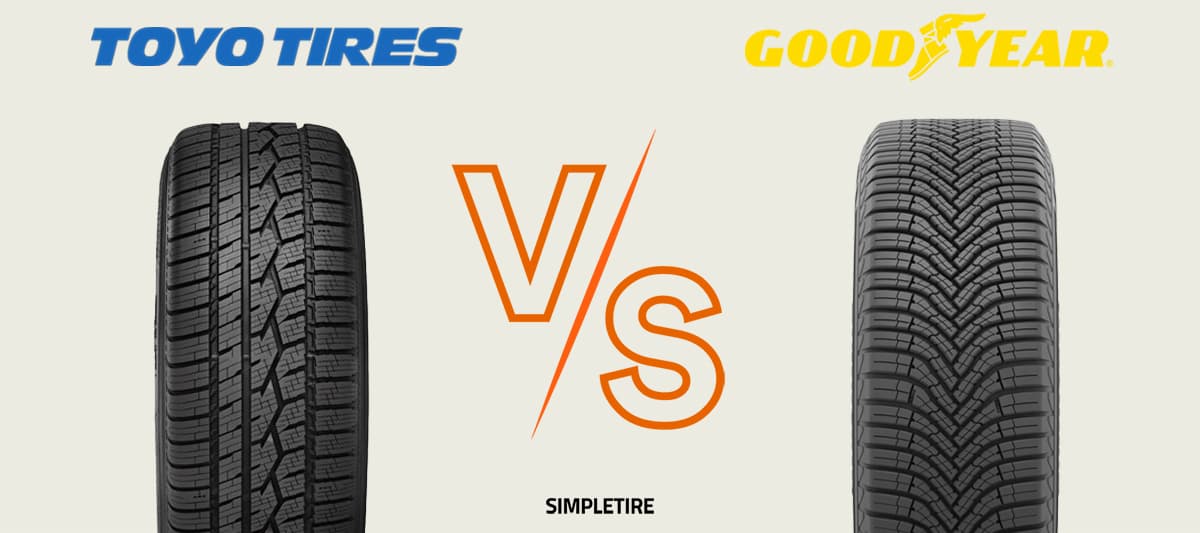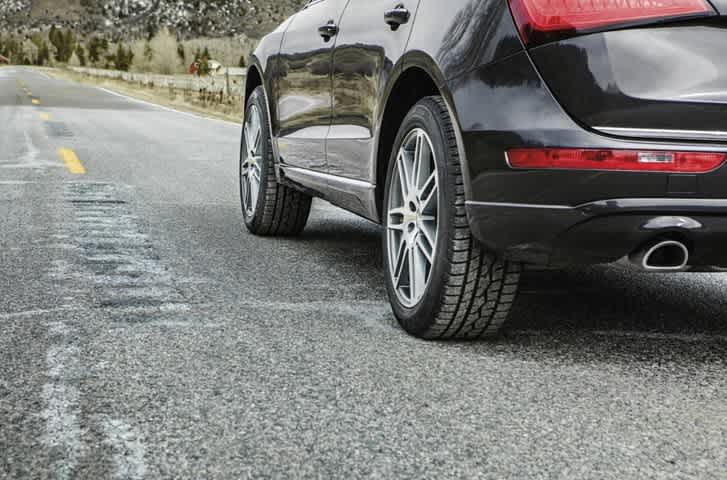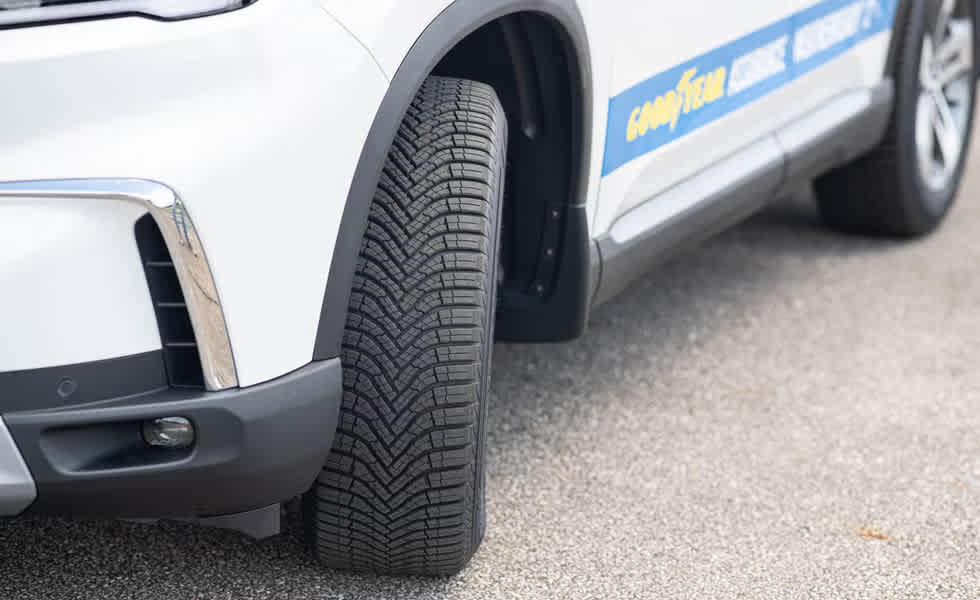Compare
Free shipping
Best price guarantee
SimpleCrew exclusive savings
0% financing options
Tire replacement coverage
24/7 roadside assistance
Easy returns

Are you acquainted with all-weather tires? All-weather tires are part of a rather new category in the tire world, taking up a niche where all-season tires often aren’t quite up to the job. The truth is that in most cases, all-season tires aren’t designed to handle the demands of winter driving when there are 3-4 inches of snow on the roads. They can’t give you the kind of traction, braking, and control you need (in most cases), so all-weather tires are loaded with features for enhanced winter traction: optimized tread formulations, more aggressive tread patterns, strategically placed sipe networks, and other design elements that offer more consistent traction in snow and slush. In other words, they’re tires that occupy a place between all-season and winter tires, without the seasonal chore of having to remove winter tires and store them once temperatures get above 40-45 degrees F.
Are you familiar with SimpleScore? SimpleScore is the system that the SimpleTire team has developed to give you a quick at-a-glance idea of a tire’s capabilities and performance. We look at the tire’s spec sheet, reviews, manufacturer information, and other data points, then take that and distill it down to a 1-10 score for the categories of traction, handling, and longevity, as well as an overall average SimpleScore for each tire. For the Goodyear Assurance WeatherReady and Toyo Celsius CUV, the SimpleScore numbers shake out as follows:
Toyo Celsius CUV
- Traction: 8.5
- Handling: 8.6
- Longevity: 8.9
- Overall average SimpleScore: 8.6
Goodyear Assurance WeatherReady
- Traction: 9.6
- Handling: 9.3
- Longevity: 8.8
- Overall average SimpleScore: 9.2
As you can see, the Pirelli and the Goodyear compare well with each other in the SimpleScore rankings and both tires bring quite a bit to the game. But the SimpleScore is the 30,000-foot view that doesn’t tell the whole story, so let’s get into it in a bit more depth in this product comparison.
Toyo Celsius CUV tires

When the Toyo design team was laying out their plans for the Celsius CUV all-weather tire, they definitely put a heavy emphasis on winter traction and performance. The Celsius CUV is designed around a tread compound that’s optimized to stay pliable for consistent grip at subfreezing temperatures while still being durable enough for long miles. It’s molded into an asymmetric all-weather tread pattern with Toyo’s innovative slush grooves that route water, snow, and slush away from the tire’s contact patch. Snow claws have the double job of improving traction and boosting rigidity across tread blocks for improved control, handling, and braking performance on snow or ice. The innovative network of sipes in the Celsius CUV is designed with a higher density towards the tread’s center blocks for a ferocious grip on snow and slush, then a sparser pattern towards the shoulder for improved handling and stability. The asymmetric design also makes it easy to cross-rotate tires to help ensure even wear. Internal testing at Toyo’s test track shows a distinct advantage in handling and braking distances compared to the competitors’ tires. The Celsius CUV is Three Peak Mountain Snowflake certified for severe winter service. Toyo covers the Celsius CUV with a 60,000 mile limited manufacturer’s tread life warranty.
Goodyear Assurance WeatherReady tires

Next, we’re going to take a look at the Goodyear Assurance WeatherReady, a premium Grand Touring tire designed to the performance standards of an all-weather tire. Goodyear designed the Assurance WeatherReady with an environmentally sustainable, silica-rich, soy-infused tread compound for consistent traction and excellent wear properties. Internal construction details of the Goodyear WeatherReady include two wide steel belts that support a single-ply polyester casing and a polyamide layer that’s designed for secure high-speed stability, comfort, and quick, light steering response. Of course, one of the strong points of the Goodyear Assurance WeatherReady is its year-round traction; its tread design includes a system that incorporates outboard ribs for traction on wet or snowy roads, Goodyear’s 3D TredLock Technology Blades, and specially designed sipes toward the center block of the tread. While it makes sense that most tires will lose traction and performance as tread depth gets thinner, Goodyear’s Evolving Traction Grooves are designed to keep traction as the miles pile up and tread depth wears down. Sweeping Tread Grooves and the tire’s circumferential grooves work together as a comprehensive system to disperse water from the tire’s contact patch and resist the tendency to hydroplane. In snow and slush, traction and control get a boost from Zigzag Biting Edges along the tire’s inboard ribs, earning the Goodyear Assurance WeatherReady the tire industry’s Three Peak Mountain Snowflake certification for severe winter service. Goodyear backs the Assurance WeatherReady with a 60,000 mile limited manufacturer tread life warranty.
Toyo Celsius CUV vs Goodyear Assurance WeatherReady tires on traction
The Goodyear and the Toyo both put in a very strong showing on their SimpleScore rankings for traction, with the Toyo registering an 8.5 and the Goodyear coming in at 9.6. Both tires have impressive sets of tread features for winter traction (although their designs are fairly different from each other) and both have the Three Peak Mountain Snowflake certification for severe winter service. The Goodyear in particular, though, is designed with features like Zigzag Biting Edges, Traction Grooves, and Sweeping Tread Grooves that all come together as a system for peace of mind and driver confidence in all kinds of weather conditions. The end result is a tire that delivers consistent grip on dry, wet, or snowy pavement, with great control and short braking distances. Performance with the Toyo is pretty respectable too with that 8.5, but it doesn’t stack up that well against the Goodyear in this category. Our call:
ADVANTAGE: Goodyear Assurance WeatherReady
Toyo Celsius CUV vs Goodyear Assurance WeatherReady tires on handling
When you think about it, handling and cornering performance with any tire will be tied directly to the tire’s traction. If your tires aren’t getting a good purchase on the pavement as you enter a turn, handling is going to suffer; your front tires could skew far outside of your desired path going into a corner (understeer) or your rear wheels can come around and fishtail, kicking the rear end out (oversteer) and possibly leading to a momentary loss of control. So, with that in mind, the SimpleScores for handling for the Toyo and Goodyear come out almost the same as with traction: 8.6 for the Toyo Celsius CUV and 9.3 for the Goodyear Assurance WeatherReady. Those are both outstanding SimpleScores for traction, so you should be able to expect crisp cornering and handling with both tires along with excellent control and driver feedback. The Goodyear does edge out the Toyo here, though, so our call is:
ADVANTAGE: Goodyear Assurance WeatherReady
Toyo Celsius CUV vs Goodyear Assurance WeatherReady tires on longevity
When it comes to the longevity category for SimpleScore, it just stands to reason that the numerical score is going to be closely tied to the tire’s limited manufacturer’s tread life coverage. Sure enough, the Toyo and the Goodyear both have identical mileage warranties of 60,000 miles each and near-identical SimpleScore numbers of 8.9 for the Toyo and 8.8 for the Goodyear. A difference of a tenth of a point can be a rounding error, but usually, it’s the kind of thing that’s skewed a bit by customer reviews. The customer reviews are what moved the needle on this one, so our decision is:
ADVANTAGE: Goodyear Assurance WeatherReady
When to use each
When it comes to consistent, confident traction year-round, the Toyo Celsius CUV and Goodyear Assurance WeatherReady are first-rate choices in all-weather tires. Both tires have the 3PMSF certification for winter traction, perform well whether it’s rough winter weather or broiling summer heat, and have generous manufacturer’s tread life coverage. As we noted from the start, all-weather tires are a good way to go when you have to make your way through difficult winter weather but you really don’t want the headaches that go with specialized winter tires. Winter tires use a tread compound that’s softer so it can stay flexible for grip at subfreezing temperatures (think the traction of a rubber boot vs. a hard-rubber hockey puck), but that tread compound will also wear prematurely on warmer days. When temperatures get above 40-45 degrees, tire manufacturers advise swapping your winters for all-season tires again - leaving you with the headache of dismounting them and figuring out a place to store them for the next nine months until winter comes around again. In fact, using winter tires in warmer weather will void the warranty. All-weather tires are a great way around that; if that sounds like your situation, you can’t go wrong with either the Goodyear or the Toyo.
Which one should you choose?

After totaling the numbers and looking at all the features and benefits of these two tires, it’s pretty clear that the Goodyear comes out on top with an overall average SimpleScore of 9.2 vs 8.6 for the Toyo. The Goodyear has a superior set of design features and materials that give it an edge in all the SimpleScore categories, but that doesn’t mean that the Toyo is necessarily a bad choice. The Toyo’s asymmetric all-weather tread with snow claws and an innovative system of strategically placed sipes means that it acquits itself pretty well in difficult driving conditions too. Then there’s price to consider, and there’s a fairly considerable spread between starting prices for the Toyo and the Goodyear. We’d just phrase it this way: if you can afford the Goodyear Assurance WeatherReady, that would be a great choice for your vehicle. If you want to save a considerable chunk of change on a set of four tires, you won’t be disappointed with the Toyo Celsius CUV. Either way means uncompromising performance and exceptional value in all-weather tires, so our opinion here at the SimpleTire team is that you won’t be making a bad call either way.
Still not sure which tire to buy? Fortunately, SimpleTire is here to help as our helpful agents are more than happy to assist you in selecting the right tire for your ride and budget.
Ready to find the perfect tires?
Search By